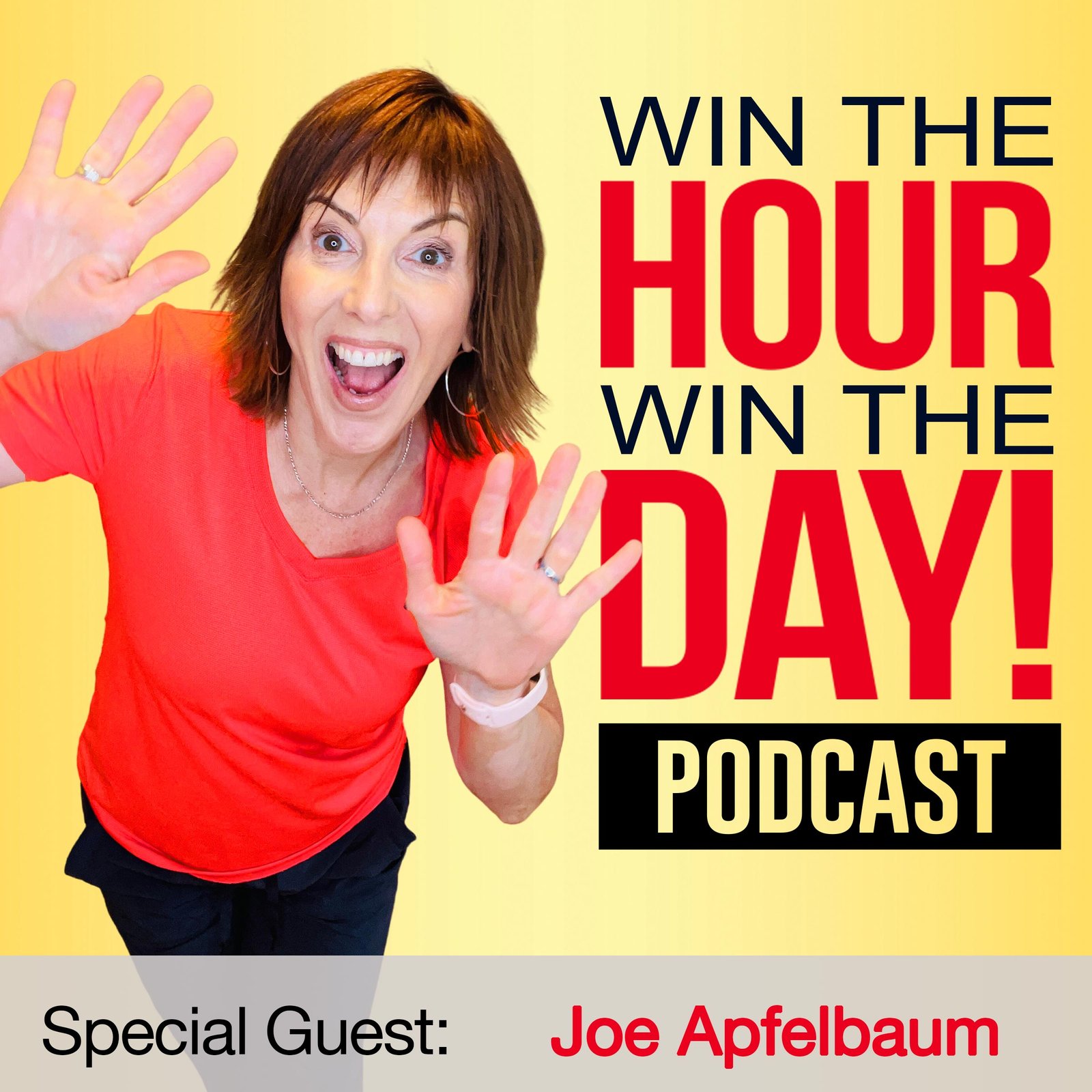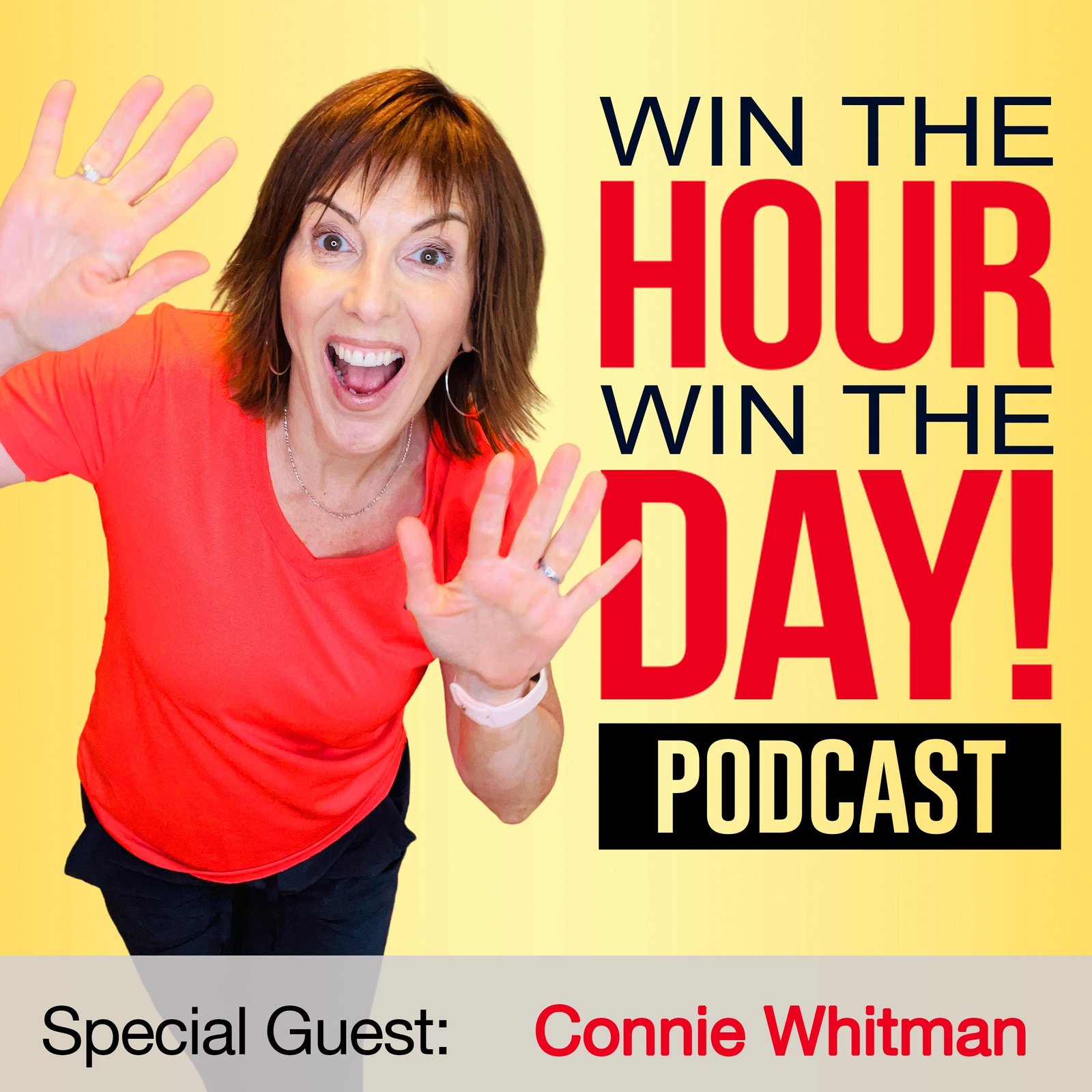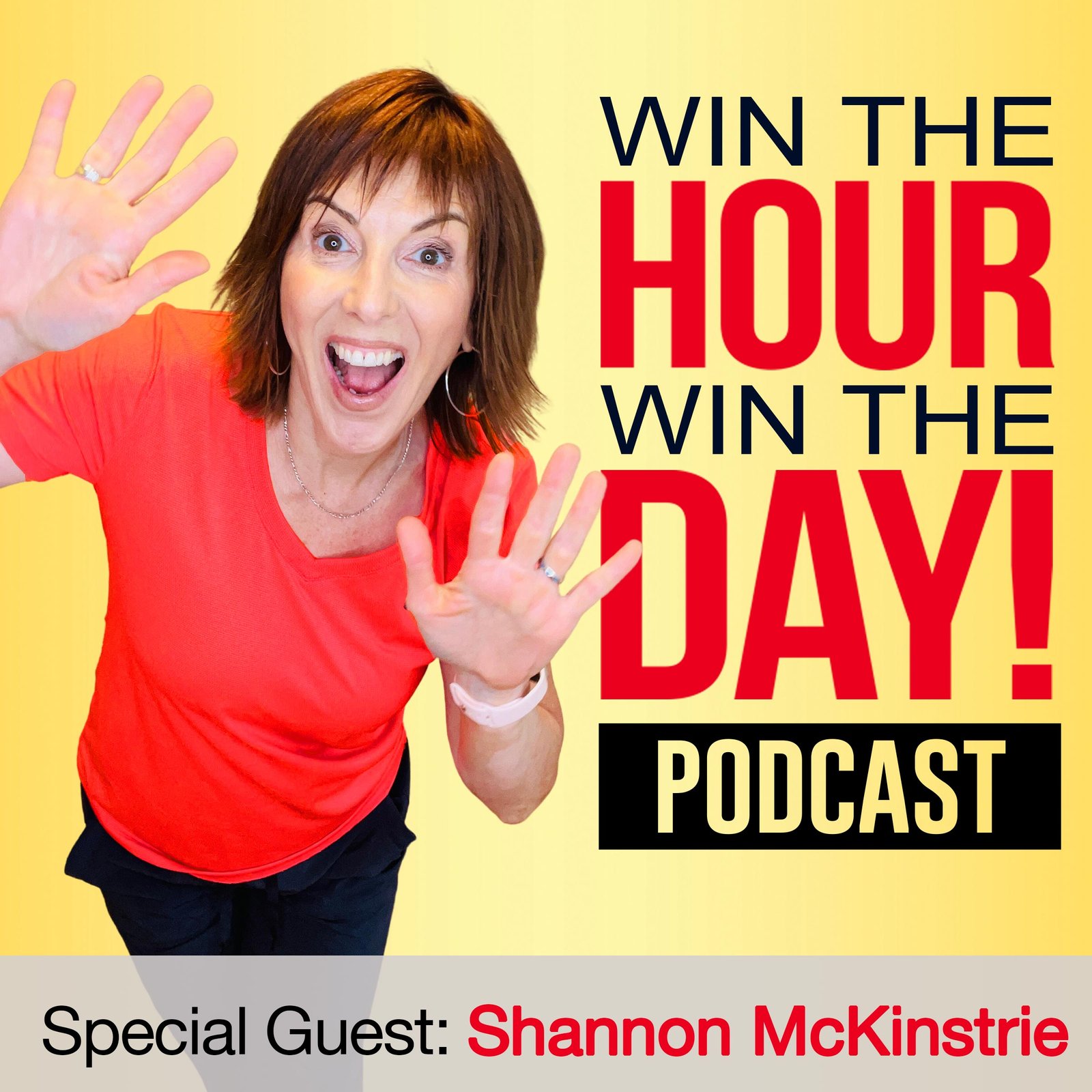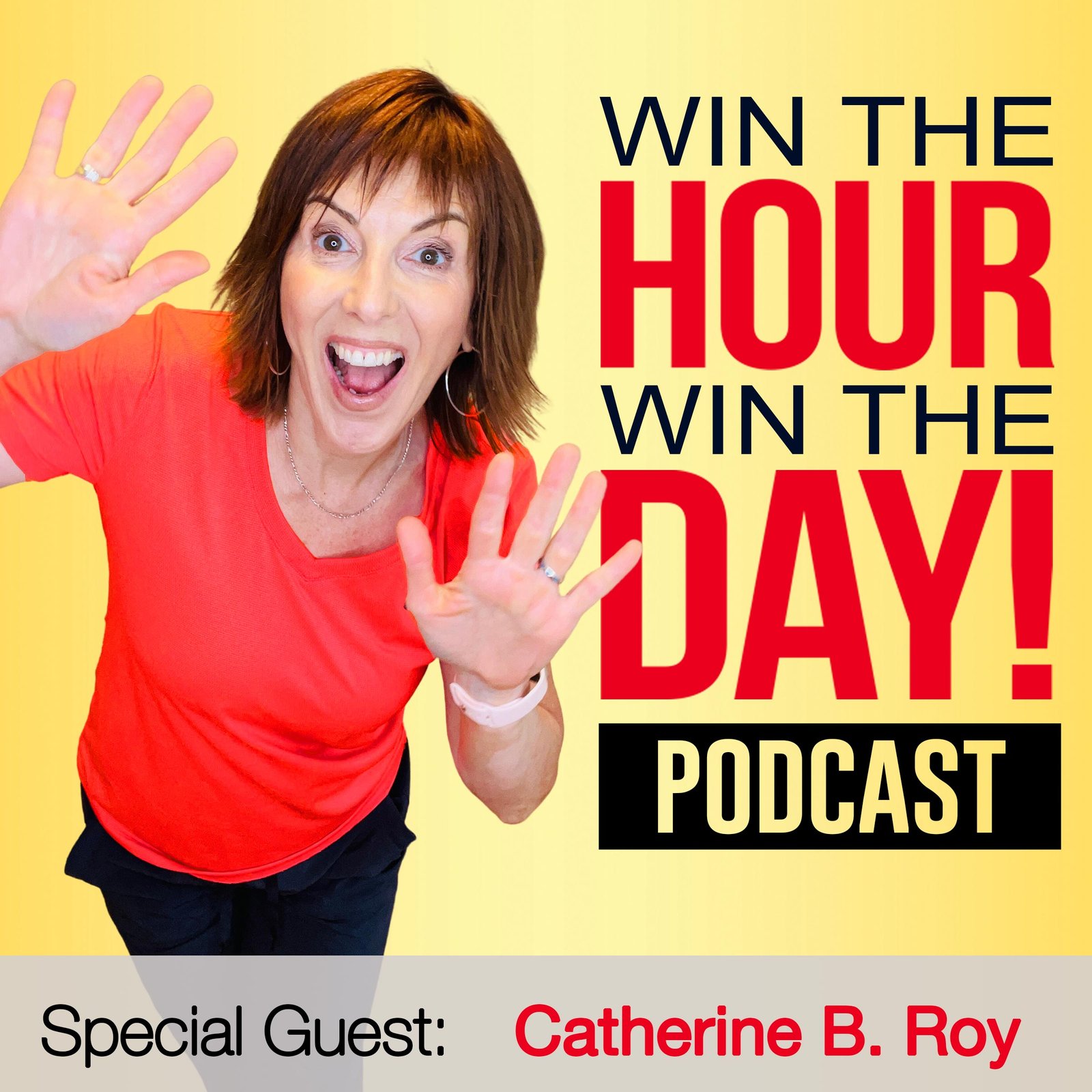Episode Summary This week’s episode of Win The Hour, Win The Day Podcast is...
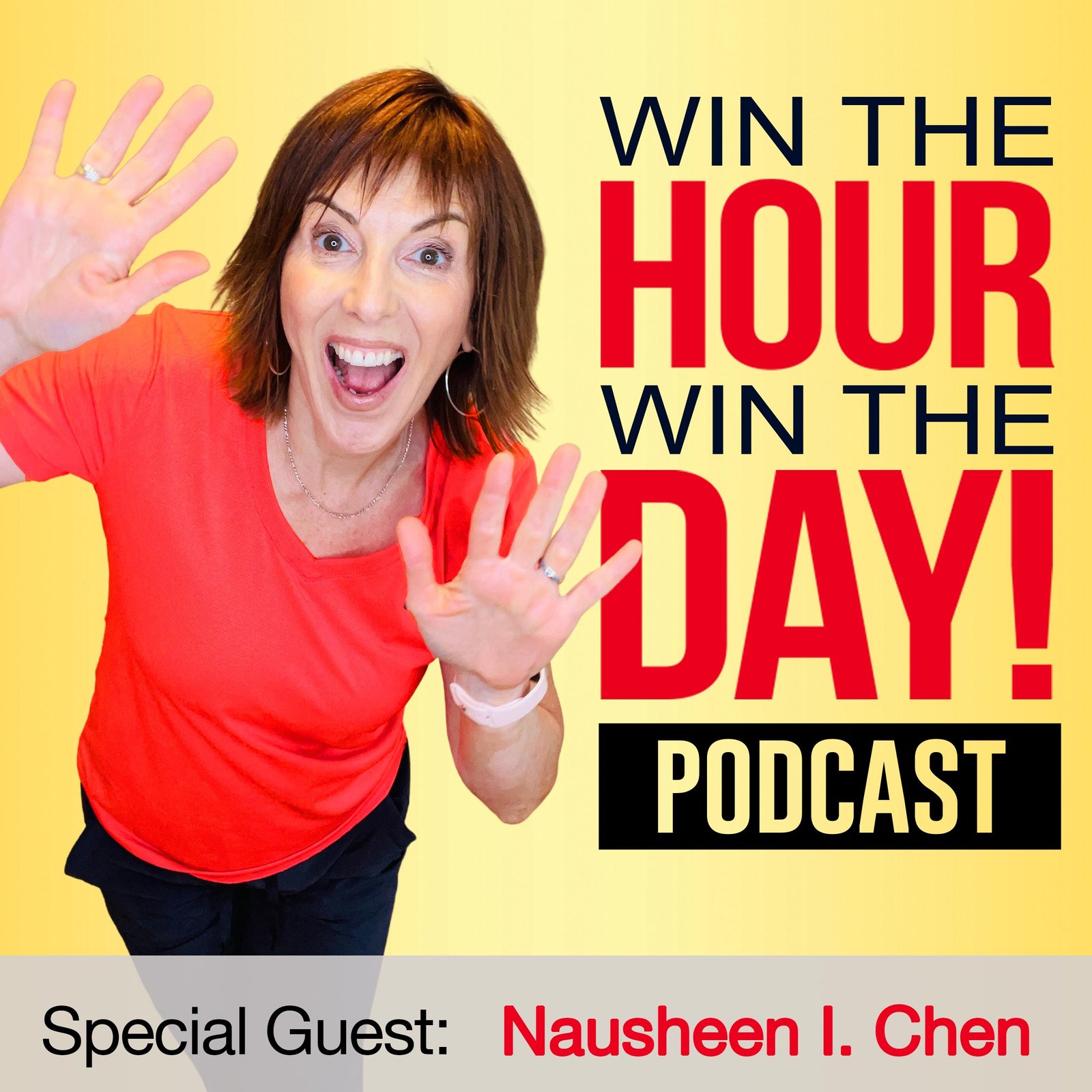
Are You Ready For Your Next Big Win?
Know your entrepreneur personality and I’ll take it from there!
Recent Podcast Episodes
Preventing Burnout with Smart Work Tools! with Kris Ward
Episode Summary This week’s episode of Win The Hour, Win The Day Podcast is...
Master Social Selling: Heidi Medina’s Strategies for Engagement
Episode Summary This week’s episode of Win The Hour, Win The Day Podcast is...
Boost Productivity and Master Storytelling! with AmondaRose Igoe
Episode Summary This week’s episode of Win The Hour, Win The Day Podcast is...
Master Video Marketing: Top Tips for Entrepreneurs with Dan Bennett
Episode Summary This week’s episode of Win The Hour, Win The Day Podcast is...
Boost Your LinkedIn Strategy with AI Tools for Enhanced Productivity! with Joe Apfelbaum
Episode Summary This week’s episode of Win The Hour, Win The Day Podcast is...
Mastering Personal Branding with NLP Techniques! with Olesija Saue
Episode Summary This week’s episode of Win The Hour, Win The Day Podcast is...
Innovative Lead Generation and Email Automation Secrets with Jennie Wright
Episode Summary This week’s episode of Win The Hour, Win The Day Podcast is...
PR Strategies for Diverse Entrepreneurial Impact! with Jennifer Singh
Episode Summary This week’s episode of Win The Hour, Win The Day Podcast is...
Convert More Clients on LinkedIn with Richard Moore
Episode Summary This week’s episode of Win The Hour, Win The Day Podcast is...
Master Business Growth on Pinterest with Meagan Williamson
Episode Summary This week’s episode of Win The Hour, Win The Day Podcast is...
24/7 Sales Boost: Video Marketing Secrets with Alex Sheridan
Episode Summary This week’s episode of Win The Hour, Win The Day Podcast is...
Beating The Burnout With Connie Whitman’s Success Story
Episode Summary This week’s episode of Win The Hour, Win The Day Podcast interviews,...
Craft Your Social Media Content Strategy With Shannon McKinstrie
Episode Summary This week’s episode of Win The Hour, Win The Day Podcast is...
Boost Your Productivity with AI Tools: A Deep Dive with Erik Fisher
Episode Summary This week’s episode of Win The Hour, Win The Day Podcast is...
Boost Visibility: Repurpose Content and Leverage Podcasts With Christina Lenkowski
Episode Summary This week’s episode of Win The Hour, Win The Day Podcast is...
Master Personal Branding & Storytelling with Lisa McGuire
Episode Summary This week’s episode of Win The Hour, Win The Day Podcast is...
Boost Business on LinkedIn with Catherine B. Roy’s Strategies
Episode Summary This week’s episode of Win The Hour, Win The Day Podcast is...
Scale Your Business: Optimizing Virtual Assistant Services with Kris Ward & Rachel Eubanks
Episode Summary This week’s episode of Win The Hour, Win The Day Podcast is...
Affordable PR Mastery: Crystal Richard Unveils Modern Techniques
Episode Summary This week’s episode of Win The Hour, Win The Day Podcast is...
Mastering Business Storytelling with JJ Peterson’s Guide
Episode Summary This week’s episode of Win The Hour, Win The Day Podcast is...
Revamp Your About Page: Guide to Personal Branding
Episode Summary This week’s episode of Win The Hour, Win The Day Podcast is...
LinkedIn Mastery and Video Marketing Secrets with Alex Sheridan
Episode Summary This week’s episode of Win The Hour, Win The Day Podcast interviews,...
The Systems and Processes Playbook: Insider Secrets to Streamlining Your Small Business with Leah Abunales
Episode Summary This week’s episode of Win The Hour, Win The Day Podcast interviews,...
Getting Noticed: PR Strategies with Dina Behrman
Episode Summary This week’s episode of Win The Hour, Win The Day Podcast interviews,...
Master Public Speaking Tips with Nausheen Chen!
Episode Summary
This week’s episode of Win The Hour, Win The Day Podcast is sponsored by Win The Hour, Win The Day’s Signature Coaching Program the Winners Circle. Kris Ward who helps entrepreneurs to stop working so hard interviews, Nausheen I. Chen.
Do you want to share your ideas better…
and grab everyone’s attention?
Join me as Nausheen Chen, a brilliant public speaking coach…
reveals how you can shine in any speaking moment.
In this eye-opening talk, you’ll discover:
-How to spice up your speaking with voice, energy, and body moves.
-Simple tricks to stop saying “um” and “uh” and speak smoothly.
-Why your voice is a powerful tool that can make people listen and remember you.
Get ready for practical tips that will change…
the way you talk in videos…
meetings, and even chats with friends!
Don’t miss this chance to become a confident and memorable speaker.
Power Personality Quiz! http://winbacktimequiz.com/
Win The Hour, Win The Day! www.winthehourwintheday.com
Podcast: Win The Hour, Win The Day Podcast
Facebook: https://www.facebook.com/winthehourwintheday/
LinkedIn: https://www.linkedin.com/company/win-the-hour-win-the-day-podcast
You can find Nausheen I. Chen at
Website: https://www.speaking.coach/
Win The Hour Win The Day
https://winthehourwintheday.com
Nausheen I. Chen Podcast Transcription
[00:00:00] Kris Ward: Hey, everyone. Welcome to another episode of Win The Hour Win The Day, and I am your host, Kris Ward.
[00:00:04] And today we have in the house, Nausheen Chen, and she is a public speaking coach. Now let’s talk about public speaking for a minute now, because as entrepreneurs, you back in the day, public speaking meant, maybe in front of your classmates or on stage, but now it’s everywhere because we have to do it all day long.
[00:00:21] I’m doing it right now. We have to do it video. We have to do it all the time. So let’s see what we can learn. Welcome to the show, Nausheen.
[00:00:29] Nausheen I. Chen: Thank you so much, Kris. It’s been a week of me looking forward to this. So I’m so excited for this conversation.
[00:00:36] Kris Ward: I like people that are excited to be here. So let’s go.
[00:00:39] Okay. I would say giving you a little bit of pushback, if I can right off the bat, give you feedback. I think what you do, cause I’ve seen what you do and you’re pretty gosh darn spectacular at it. You stop the scroll and any social media platform I’ve seen you on. So I’m going to tell you, I would be changing it, amping up my public speaking coach name because I think you’re… you’re much more dynamic than that.
[00:01:04] So work on that. But as we do this, let’s dive into it. So where should we start? What is it you think we need to know under the framework as you call it, playing with your voice? I find that fascinating.
[00:01:17] Nausheen I. Chen: Playing with your voice.
[00:01:18] Kris Ward: Notice I’m trying to play with my voice. I just don’t holler at Nausheen for an hour.
[00:01:24] Nausheen I. Chen: Very meta. You actually hinted at this a few minutes ago when you said that we need to challenge this definition of public speaking. When we talk about public speaking, a lot of people imagine a big stage or speaking at a podium. And of course that’s the typical boring definition of public speaking, but we are speaking to an audience now more than ever before.
[00:01:49] But what happens is a lot of us are lazy. We are lazy communicators and lazy speakers. We ramble, we lack focus. We use a lot of filler words and that’s on the content side of things. On the delivery side, we don’t use our full vocal range. We don’t project the way that we should be, or we project too much.
[00:02:14] We get lazy with our body language. We either just keep our hands like this, or then we just use them all the time uncontrollably. People get away with this. So we’ve lowered our standards for good communication, but then when you come across someone who’s really being intentional about the way they speak, that’s when they command attention.
[00:02:36] That’s when they become memorable. So that’s what great speaking is about.
[00:02:41] Kris Ward: Okay. So much to impact on there already. So one of, when I’m working with my clients now, they have access to me on a daily basis. And so one of the supporting tools we have is Voxer so that we can catch things when we’re working with a client who, they want 25.
[00:02:56] They all tell me they get 25 hours back a week within the first month of working with us. And one of our success pillars is by how much access they have to me so we can get all the little micros. In that we use Voxer as well. And Voxer for those of you don’t know, it’s like a little walkie talkie messaging thing, go back and forth.
[00:03:13] I leave an audio recording and stuff. I am really mindful now with Voxer is that we all have a tendency that when we say a message and then we explain something, then it’s, you, we tendency to repeat and summarize it again. And so I’m really trying hard not to do that. I also learned from Rain Bennett who was on our show talking about storytelling and one of his, he wrote this whole story about, how his wife said, okay, you gave the punchline, told a funny story, and then you repeated it.
[00:03:39] Like you repeat, Oh, cause it’s so funny. You repeat it again. So I think there’s so much clean up. For us all to do. We all see it in somebody else when, too many umms or whatever, but even just the repetition of the story that in itself really dilutes and takes up time when you could be moving on to something else.
[00:03:59] So there’s so much rambling is one thing, but I think even repeating it, repeating yourself, I repeat myself about repeating myself. Here we go. Stop.
[00:04:08] Nausheen I. Chen: We’re very meta on this podcast today.
[00:04:11] Kris Ward: Yeah. Oh my God. But do you see that? That’s really what I was about to do. And I think people tell me I’m one of a more clear communicator.
[00:04:21] Because I’m very direct and I don’t like that word. I don’t, because it sounds negative. But I think the kindest thing you can give somebody is a truth. So I don’t. I’m, I would never be rude or cold or mean. You can be clear. Maybe clear is a better word than direct. You can be clear and thoughtful.
[00:04:37] So I’m told all the time I’m exceptionally clear and yet I’m repeating myself. So what the heck, where do we start?
[00:04:43] Nausheen I. Chen: You always start by first understanding how are you actually communicating? Because not only are we lazy speakers, but we never really take time to look at ourselves as speakers. We look at our KPIs for many other things as business owners, as VPs, or as people that are working in any business, you have a lot of things that you look at and you look at your growth in terms of those metrics, but people rarely look at how good they are as communicators.
[00:05:18] So it has to start there where you look at how are you communicating literally record yourself, record meetings, do speaking exercises where I just. I, there’s a thumbs up there. That’s fine.
[00:05:33] Kris Ward: I know. Sorry. We’re on video and I don’t know. Zoom does this thing now. If I move my hand, I got a thumbs up bubble came up. I wasn’t doing that. I had my hand on my pen. So there we go. Sorry. Distraction. Go ahead.
[00:05:45] Nausheen I. Chen: No, it’s very cool. I was more interested in your expression there. Cause you’re also a very expressive person
[00:05:49] Kris Ward: which that has gotten me in a lot of trouble.
[00:05:53] People will look and say something. I’m like, I didn’t say anything. They said, we can see your face. I’m like, okay, that’s not fair.
[00:05:57] Nausheen I. Chen: That’s right there. Kris.
[00:05:59] Kris Ward: Yeah. Yeah.
[00:06:00] Nausheen I. Chen: Yeah, so that’s where we start. We start by looking at ourselves as cringy as that is, because I always have clients who tell me, Nausheen, I can’t watch a video of myself talking.
[00:06:11] I just can’t. And a lot of people will actually have these recordings from their sales calls, from their team meetings that they never look at, there’s all that data waiting to be mined. So that’s where we start. I also have all my clients do a self evaluation and an anonymous self evaluation. Beer evaluation, where we ask their clients, their teams, and even their friends and
[00:06:34] family.
[00:06:35] Kris Ward: I don’t want an anonymous evaluation. I want to have some influence. Okay. So let me jump in here again. I think also Nausheen that some of us would look at I’m used to seeing myself on video. So be it. But then I also think sometimes we go well, This is it. This is how tall I am. Like, this is it. This is just what comes out of me.
[00:06:59] I know my excuse. I’ve worked so hard on not speaking quickly, but my mom came from a very large family. And so you talk quickly, you talk fast and frankly, loud. They’re all very loud because you have to hear over other people. And I, they think I’m quiet and low energy and reserve. So this tells you about the company that I’m keeping, right?
[00:07:18] So then you can default to, this is who I am. Now, I will tell you, I have taken two public speaking courses on how to speak slower. And I do speak slower. Although my husband said I should have got my money back on both of them. I speak slower than I used to, and I am mindful of it, but sometimes it is really hard to go against what we just feel is this is my breath. This is how it comes out of me.
[00:07:44] Nausheen I. Chen: That’s a great point because I feel like there is this bell curve of growth. There is this point where we’re complacent with where we are, who we are, till the point where it becomes too painful. And we’ve all been there in terms of not going to the gym. Not keeping in touch with old friends, not eating healthy, not having enough water, not getting enough sleep things that we know are good for us, but they’re nice to have.
[00:08:12] So I find this all the time with people that feel that communication skills are nice to have, of course, no one’s going to argue when we say they’re important, but then they don’t feel like they’re indispensable. They don’t feel like they are at a point where it’s painful enough for them to change. And once you see that, I typically see this with clients who’ve unfortunately seen some kind of trauma.
[00:08:38] They’ve frozen on a podcast. They’ve had to run off a stage. They’ve said yes to speaking at a big event, and they feel absolutely overwhelmed, and they feel like an imposter. So when something like that happens, it triggers something in them. And they realize that something’s missing. I know I’m not good enough as a speaker. I just don’t know how to get to the point where I feel proud of myself.
[00:09:05] Kris Ward: Okay, that’s a really good point because I think the rest of us what happens is it’s okay, yes I know I hear myself talking too fast or blaring at one level and I need to change my tone at different times So I do try to be mindful of that. But we also are not in a situation where we’re not getting a lot of feedback Like I’ve listened to podcasts where somebody said, at the end of every podcast Every sentence to the point that I just couldn’t listen to it.
[00:09:30] I’m like, I can’t do it because I’m no longer listening to what they say. I’m counting 1 1, 2, 3, 4. And so I don’t know if anyone’s ever told that person, or they certainly didn’t say like I had to turn you off because I couldn’t do it. So we’re not searching for that feedback. No one’s offering it because who’s going to say to you, listen, you’re painful to listen to not very many people.
[00:09:51] So then, it’s upon us to self diagnose and take it to a better game. Cause you’re right. It’s our biggest tool as a business person, who we are, how we express ourself. And yet we’re not leaning into it. Okay. So what are some things that we can look at to improve? Where do we like, where do we start with the basics of improving?
[00:10:10] Nausheen I. Chen: So I work with all my clients on this magic trifecta that I feel it really encompasses a strong speaking tool kit, you can analyze any Ted talk and you’ll see the speaker using exactly this framework. So they’re playing with their voice. They’re playing with their energy and they’re playing with their body language.
[00:10:34] And your body language is not just your posture. It also includes your facial expressions. It includes, of course, your gestures, how you’re moving and so on. So the voice, the energy and the body language are those 3 basic skill sets that I teach people and once you can master all three, you’re absolutely being a lot more intentional about the way that you speak.
[00:10:57] Kris Ward: I like the word playing. That’s interesting because we do tend to clump these things together. Or pick one and say, Oh, I speak too quickly. And I work on that or I’m going to pick on other people. I’ve seen people that are teaching public speaking and performance like that. And then they get into nuances that I just don’t buy into Oh, if you hold your hands in a triangle, whatever they, they start getting into stuff that this means power. Who says this means power because you said it means power. That it’s just stuff for busy work, I think, for the sake of doing it. But the idea of seeing this as three separate things and the ability to play with my voice, my body, my energy, when to bring my energy up, when to bring it down.
[00:11:40] All those things really are purposeful. And you can feel it versus doing these arbitrary gestures that somebody says makes your audience feel empowered. So now you’re doing this just for the sake of it, but you have no qualification if it’s having any impact where the playing with these three components you do.
[00:12:01] Nausheen I. Chen: I love that you brought up the performative aspect of it because it’s something that I took into account very early on. So a bit about the way that I’ve been speaking, I’ve been speaking on stages, on camera, on TV, on radio for 17 years, but I didn’t always have inner confidence from a very young age I became really good at portraying confidence at putting on a show.
[00:12:29] I don’t know how it happened, but it just did. So I would go on stage and I would deliver this great presentation or a great training and everyone would say, wow, you are so confident you were so impactful. And I would feel empty and hollow inside because I knew it was just a show. And when I started teaching this to people, my biggest priority was not to just show them that this is a performance.
[00:12:58] Not to make it so that it’s just people using this gesture or showing this, showing up this particular way without actually feeling that inner confidence.
[00:13:10] Kris Ward: Also then you do tend to lean into, I struggled with this with social media in the beginning is I’m talking at people instead of to them.
[00:13:16] Nausheen I. Chen: Yes.
[00:13:17] Kris Ward: So yeah, I understand that. I felt that when I was doing social media, that some, what, if I wasn’t mindful, I was speaking at them, not to them. And so it made a difference. Okay. So when we’re playing with our voice, our energy, and our body language, what are some things that we do with each one of them?
[00:13:33] Nausheen I. Chen: Sure. So when it comes to the voice, I teach a very specific framework that is very comprehensive and it teaches you a lot about your own voice and how you can use it.
[00:13:43] So I teach the 5P framework, which includes your pacing, your pitch, your pauses, your projection. And the 5th B is a little bit tricky because the 5th P is Pronunciation, but I actually work with my clients on enunciation, not really pronunciation, not their accent, but how they’re enunciating. So that framework makes you realize how powerful your voices and how you can, again, play with different aspects of it.
[00:14:17] Because if we just say play with your voice, Kris, you probably understand it because you have a lot of experience doing this podcast and you know how to go higher or lower. But this way, you can really think of it in a very comprehensive way and include the pauses in there, include that projection piece in there where people are either over projecting or they’re being so soft that they can barely be understood.
[00:14:43] Kris Ward: I’ll tell you, I still have to think about that for a couple of reasons. Like I always make the joke, one of the most famous speeches in the world is Martin Luther King’s, I had a dream speech. And I could recite that speech and come at it with completely different energy and it would have been a whole different game, right?
[00:14:58] It would have come off like a child. The problem is when you’re going too fast. And your enthusiasm can lose its control. You sound I think like a child. So I could have been like, Oh my gosh, I had a dream. Listen, I got to tell you about my dream. And it would have went so fast. And the pacing of him to slow that down and leave dramatic pauses in space is something that most of us are not comfortable with, I even know, as I mentioned, talking to boxer at first, it was, I would speak too quickly because it’s somewhere in my brain. I’m thinking, oh, this message will be too long for them, even though they’re paying to hear from me. And I’m their coach. So I’m trying to speed it up to get to the point.
[00:15:38] And so I think even pacing for those of us. I do this all the time. I’m on a lot of shows. I’m hosting a show. I do a lot of videos. And yet it’s really easy to get caught up and speed up, nevermind pitch. You can’t even think about pitch if you’re not slowing down to pace anything.
[00:15:57] Nausheen I. Chen: And that’s a really great point.
[00:15:58] A lot of people speak really fast. It’s definitely more common than speaking too slowly, although I have worked with a few clients who speak really slowly and they’re not in the flow. And one of the big reasons is, as you mentioned, that they want to get things over with, they feel that they don’t want to take up more time.
[00:16:18] A number of other people are also concerned that they’re going to be interrupted. If they’re speaking meetings, we, I also have a bunch of people that want to get the thought out before they forget it, because they have so many thoughts in their head. So it all comes down to creating a filter. The speed of your thoughts should not dictate the speed of your speech.
[00:16:41] Kris Ward: That is tricky.
[00:16:42] Nausheen I. Chen: You should be able to separate the two. Yes, it is. And it adds cognitive burden. It adds more processing that we’re not used to, but it’s absolutely something that can be mastered. And once you can master the flow of your thoughts and the way that they’re coming out of your mouth, then you really are a very influential speaker because you don’t have to say every single thing that occurs to you. And you can then control your pacing, your pitch, add in those pauses.
[00:17:12] Kris Ward: And I think another P we can add is being purposeful. Cause then you’re so purposeful. You’re, you’re purposeful about what you write and you proof it and you reread it. And now you can be purposeful without it being scripted.
[00:17:22] Cause I’m not a big fan of that either. I love when you see somebody like, I don’t know, like a politician or like somebody in royalty where they have to read those speeches and then they stand there and say, and I feel if you felt it, would you have to read it? You know what I mean? And so I don’t think the scripting works, but you could be more purposeful when you’re mindful of your pacing, your pitch and things like that.
[00:17:44] All right. So we talked about voice. Let’s talk about energy because this will be interesting to me. Where do we go with this?
[00:17:52] Nausheen I. Chen: The energy is possibly one of the more misunderstood aspects of the system because when people think of energy, They either think of his bubbly cheerleader, who’s just going to be energetic all the time.
[00:18:04] And I get so much pushback from clients on that saying, Nausheen I’m just not very bubbly. I don’t want to be bubbly. Your energy is the way that you show up and the way that you tell someone that what you’re saying means something that you want to stand up and be counted. You want to be heard and felt as a presence.
[00:18:30] So it’s one of those things that you can really identify when you see it. It’s that level of engagement and presence that you bring when you feel that the speaker is with you, 150%. They’re not distracted. They’re not just there for the sake of delivering a PowerPoint presentation. They’re not just there reading off of a sales script to your point.
[00:18:54] They are actually there and they bring their entire presence. They bring energy into the conversation. And something that I always. Something that I always tell my clients, especially when they’re giving a talk, when they’re speaking to an audience is that you become the energy ceiling and the energy floor for your audience.
[00:19:15] So they will either rise to your level of energy or then sink to your lack of energy.
[00:19:21] Kris Ward: That is a good point. You’re like the pace car in racing because you have, you can, you’ve, I’ve been in those audience where all of a sudden you think, Oh no, I’ve got to stay awake for this. So he just, Yeah.
[00:19:31] Brought down the energy of the room. And it is interesting because for a long time, especially when we all were pushed out of our doors and said, okay, get on social media and do videos and here it is. And now I get a lot of compliments on my high energy and my enthusiasm. But at the time I thought that would be I tried to dilute it cause I thought it came off juvenile or not professional.
[00:19:54] So I was, not being myself. Again, but at the same time, in one way, you cannot be yourself, but in the other way, you can be purposeful about that energy. So I think what you’re talking about is don’t change it for the audience sake, but more lean into it.
[00:20:08] Nausheen I. Chen: Yes, lean into it. Amplify that energy that you have, and read the room and match. Match the audience’s energy, and then raise it.
[00:20:19] Kris Ward: Right. Okay. Okay. That makes sense. Okay. Because that’s the other thing. Let’s say I was speaking to a room full of, I don’t know, I don’t want to pick on anybody. I was going to say, I was going to say like insurance people, because we’re going to assume that they’re all boring.
[00:20:32] But if the energy of the room is lower, you can bring the energy up, but you can’t be way up there. And there’s a big gap between the two of you because then they won’t be able to keep up or follow. Or you’re just overwhelming to them. Okay. That makes sense. All right. Body language. There’s so many people that talk about this and I think some of it is just.
[00:20:54] Nonsense. Sorry. So tell me where, and I don’t think you’re one of those people, but like I said earlier, I think they just make stuff up. I don’t know if they make stuff up. I just think it’s, I think we have bigger things to worry about. So tell me what you feel we should be focusing on.
[00:21:09] Nausheen I. Chen: Depends on whether you’re standing or whether you’re sitting.
[00:21:12] Kris Ward: Okay.
[00:21:13] Nausheen I. Chen: The overall principle does stay the same where I recommend. Creating this balance between stability and showing that you’re a dynamic. So when you’re standing, for example, and speaking, then I always recommend that you have your feet firmly planted on the floor. Okay. Don’t step randomly or sway.
[00:21:34] This is very common with people that fidget, that aren’t very intentional or purposeful, like you said. So having your feet firmly planted on the floor really shows that you’re grounded, literally speaking, but you’re stable and then showing that dynamism with the upper half of your body. So absolutely using your gestures, using a variety of gestures, not just the gestures that you like using all the time and being mindful of them so that you’re not overusing them and you’re not standing with your hands by your sides.
[00:22:09] And then when you’re sitting, a similar principle applies where I always encourage my clients to have their bum firmly planted on the chair. You’ll see a lot of people who swing in their chair and I don’t know about you, but this is massively distracting for me where I just feel like they are not very stable or they’re not very present.
[00:22:31] There’s something off putting about that. So yeah, similar principle. Grounded with your bottom half and then dynamic with your top half.
[00:22:39] Kris Ward: So I think what you’re saying is when you’re grounded with your bottom half, then the upper body, you’re being purposeful and orchestrating your movements. Whereas if you’re using the whole body, it’s more, it’s just an impulse or reaction.
[00:22:52] So you’re, you’re again, not being purposeful. I listen, I have a standing desk. I love it. It’s a game changer for me. That’s fine. But I am mindful that, I’m not moving around a lot, but it’s great. I was on a call with a guy and he had one of those walking desks, like a treadmill desk. And he tells you right on the beginning of the call, he’s listen, I know it’s a treadmill, but don’t worry.
[00:23:15] You’ll get used to it. And I. It was the most distracting thing I’ve ever done. I’m like, Oh my gosh. Like you did not get used to it. No, because he’s constantly moving. And when you’re walking, your head is going in all different places. So it’s not even a pattern. And you do on some level, get the sense.
[00:23:30] He’s I do this all day. Don’t worry about it. I’m listening. But you feel like you’re like, I’m in a room and you keep walking out of the room and walking in because his movement is all over the screen. And it was really hard. And I thought, my gosh, you have no idea. Yeah. I’m, yes, I have a standing desk because I think it’s good for my, it’s just really good for my health and I really want it.
[00:23:49] So whatever reason he wants it for, I feel, I support you, but you should be doing it not on your calls. You could do that the rest of the day when you’re not on calls because no one’s going to tell him how annoying that is, right? His head’s all over the place as he walks. It’s crazy. So yeah, so I can see, I support your thing about the swaying, does matter.
[00:24:07] Okay. Well… I really love the simplification of that too. That makes sense. Ground the bottom part of your body. So you’re presenting and speaking, and then you can control and be purposeful with the upper half. That’s very different than all these triangles and don’t use the V with your hand, don’t have your hands at this level.
[00:24:24] This means you’re, just whatever. Okay. Excellent. So to sum up, we’re, what’s, what are some things that you as we wrap up here, what are some things that you feel more often than not people miss?
[00:24:35] Nausheen I. Chen: The first thing that people miss is not being intentional at all. The second thing is giving up too quickly.
[00:24:42] Okay. We mentioned filler words in the beginning and we didn’t go into details, but I had this one client who really struggled with filler words and we started working on a strategy for him to eliminate filler words. The first part of that strategy is to become aware of when you’re going to use a filler word, catch yourself in the moment and then pause instead.
[00:25:05] And he hated it so much because he said, Nausheen, I can either think about how many filler words I’m using. Or I can say what I want to say. I can’t do both. And that’s the point where I see a lot of people giving up because it does get harder before it gets easier. When you start being more intentional about the way that you speak, you’re absolutely adding cognitive burden to the way that you’re communicating.
[00:25:31] Because like I said before, we are used to being lazy. We just use the way that we’ve been communicating, we use the same conditioning, the same patterns over and now as a coach, I’m asking you to stop to break that conditioning to break the pattern and to do something different and do it all day long because we communicate all day long.
[00:25:55] So that’s something that I see a lot of people do where they feel like this is way too difficult. I’m not going to be able to be effective. I’m not going to be able to present my ideas. I may as well give up.
[00:26:06] Kris Ward: Like you’re at now asking them to write with their left hand. It’s I’ve been writing with my other hand since forever, and now you asked me to change. Oh my gosh. Okay. Nausheen, where can they find more of your brilliance?
[00:26:16] Nausheen I. Chen: So I would love for everyone listening or watching in to check out my free course. It’s on my website. If you go to speaking. coach, you can get access to it. It’s right there on the top and that’s where you can also find me. And I write a lot there as well. So I’m writing new articles every two days, every three days.
[00:26:38] Kris Ward: Awesome. And we’ll make sure to put that in the show notes and listen to help a business buddy out. Share this show with them. We could all learn how to communicate much more effectively. I know I could. So make sure you share it with a business friend and we love your reviews.
[00:26:52] So thank you. Keep sending them and we’ll see everyone else in the next episode. Thank you, Nausheen.
[00:26:57] Nausheen I. Chen: Thank you so much, Kris. This was so fun.






